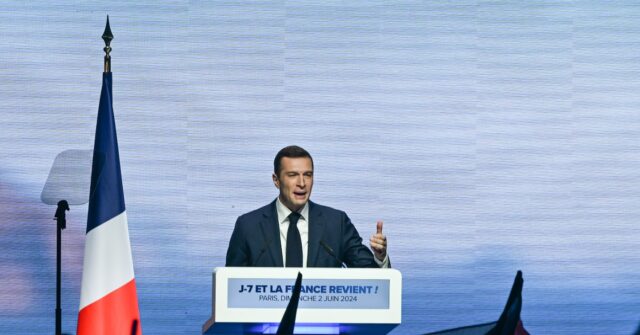The political landscape in Europe is witnessing a growing trend of support for former President Donald Trump, highlighted by the endorsement of Jordan Bardella, the president of France’s National Rally party. Bardella, a rising star in French politics, praised Trump’s strong sense of “patriotism” and his dedication to prioritizing the interests of American citizens. At just 29 years old, Bardella, who is Marine Le Pen’s deputy, has positioned himself as a potential future Prime Minister of France and leads a party that has made significant electoral gains in recent elections, including the European Parliament. His support aligns with a broader movement among European politicians who favor a nationalist agenda and are increasingly vocal about their admiration for Trump.
Bardella’s remarks, made during an interview with CNews, underscore his belief that Trump embodies a style of leadership that places national interests above global considerations. By stating, “Donald Trump defends the interests of Americans,” Bardella emphasizes a commitment to national pride that resonates with many populist leaders across Europe. Such sentiments appear to be gaining traction, especially in the current political climate where many see the need for leaders who prioritize their country’s interests amid global challenges.
This alignment between Trump and various European right-wing leaders is not isolated. In recent months, high-profile endorsements have emerged, showcasing a transatlantic solidarity among populist figures. Geert Wilders, the prominent Dutch leader, expressed his confidence in Trump’s potential return to the Oval Office, stating unequivocally that “No one deserves it more than President Trump.” This confidence mirrors a perception among many European leaders that Trump’s approach to governance is essential for a stable international environment, further empowering the narrative of strong nationalist leadership in response to contemporary geopolitical challenges.
Former British Prime Minister Liz Truss also lent her support to Trump, linking his leadership to global stability. Truss, who articulated concerns about potential escalating conflicts, suggested that during Trump’s presidency, the world experienced a safer environment. Her endorsement reflects a shared belief among certain leaders that Trump’s previous tenure was marked by a more predictable and secure international landscape, thereby increasing the calls from European leaders for his return to power as a means to restore that stability.
Amidst these endorsements, Hungarian Prime Minister Viktor Orbán stands out as a vocal proponent of Trump, particularly regarding the ongoing conflict in Ukraine. Orbán’s assertion that a Trump presidency could have prevented the war underscores a belief that only a strong leader like Trump possesses the capability to negotiate peace effectively. His comments signal a pressing desire among some European leaders for a shift in U.S. foreign policy that they feel Trump could provide, fostering a greater sense of security on the continent.
The increasing faction of European politicians, including Bardella, Wilders, Truss, and Orbán, challenges the mainstream narrative that positions Trump as a divisive figure in transatlantic relations. Instead, their endorsements paint a picture of a potent movement uniting various nationalist agendas against a backdrop of rising global tensions and uncertainties. As these leaders express their admiration for Trump’s approach to governance and international relations, it invokes a broader dialogue about the future of political cooperation and the reshaping of alliances in a rapidly evolving global landscape.

